- Home
- Clive Barker
Clive Barker's First Tales Page 4
Clive Barker's First Tales Read online
Page 4
They made their way back through the forest with Darach. In the branches the birds were singing morning songs.
Back at the cottage, Darach made a pot of porridge for breakfast and Wake-Robin brought in a basket of fruit which he had gathered.
"Simple fare, I'm afraid," Darach said.
"That cloud -" began Colin.
"Hmm?"
"That cloud we just saw –"
"Any particular cloud?"
"What do you mean: 'Any particular cloud'? There was only one cloud - the one that stopped the sun."
"Likely a thunder-cloud," said Darach.
"I know what thunder-clouds look like," replied Colin, "and that wasn't a thunder-cloud."
"Wasn't it?" Darach paused.
"You said the land was in shadow. What did you mean?"
Darach said nothing.
"What did you mean?" insisted Colin.
"Why can't you tell us?" demanded Gwen.
"Tell you what?"
"About the cloud."
"I'm afraid I know no more than you."
There was another pause. Graham broke the tense silence. "I've seen that cloud before -" he said slowly.
Darach stopped stirring the porridge, and stiffened but didn't turn round.
"Where?" asked Colin. "When?"
"In a dream. At home. When I had the candle under my pillow."
"What did you see?"
"Graham!" Darach's voice was sharp and commanding. "I forbid you." The old man's eyes bore into Graham.
Graham bit his lip and looked away.
"I - I - there's nothing to tell," Graham said. "I think I've forgotten."
There was a terrible silence. Darach began to stir the porridge again. "Well now," he said, "let us break our fast together. There will come a time for explanations, no doubt. But, as I have said, I have a job to do. We must wait, all of us. Meanwhile, you must all remain here, out of harm's way. And believe me, there is a great deal of harm, even here. Different to your world, but harm nevertheless."
"We're not children, you know," exploded Colin.
"I'm well aware -" began the old man.
"– and there's no need to treat us like children. We didn't ask to come here. If we want to put our fingers in the fire, you're not going to stop us."
"No," said Darach sourly. "Youth will have its way. But believe me, child, there will be time aplenty for finger-burning in the not too distant future. Until then, I suggest you do as I say."
Colin didn't reply, but sat and looked into the fire with tight-pressed lips, not even touching his breakfast.
The Horsemen
Colin didn't forgive Darach for calling him a child in front of the other two. It had hurt his pride, and he couldn't forget it. The next few days were therefore extremely difficult ones. Colin was almost always broody and silent, and Darach rather quick-tempered. The children wandered in the forest as far as its edge, which was the invisible boundary Darach had set. From the trees' edge they could see other cottages, roads and fields of corn, even rough fortifications in the distant hill-tops. They only went once to the eastern edge of the forest, where the cloud still towered over the mountain-tops, seething and threatening.
Their favourite spot was a small glade on the western edge, for from there, on a clear day, they could just glimpse the sea, glinting far off.
"What would happen if we went down there?" mused Graham one afternoon, as they sat in the shade of the trees, gazing out towards the sea.
"Darach said there's danger down there," said Gwen.
"Danger he won't tell us about," said Colin, remembering the insult. "Danger which probably doesn't even exist."
"Why should he warn us against it then?" asked Gwen
"I don't know," said Colin. "Maybe he's nuts. I mean, he could be, couldn't he? Living here on his own writing his book. We might never move from here if we go on listening to him."
"I thought that," said Graham.
"We're prisoners in this infernal place - just because he says so."
"He said he'd explain, when the time came," said Gwen.
"When we're as old and crabby as him you mean?"
Everyone fell silent for a moment, then Colin said, "Graham?"
"Hmm?"
"You know when you said you'd seen the cloud before?" Silence.
"You remember?"
"Yes."
"What did you see?"
"Blackness. A sort of pit. I can't remember much more. There was a tower, I think, shining."
"What else?"
"Don't push me. I can't remember. It's all confused. I'm sorry Colin, I've tried to remember, often. But I can't."
"Do you think Darach knows?" asked Gwen. "About what's in the cloud?"
"About everything."
"I don't think he knows everything, no," said Graham. "He says he's got a job to do. Keeping us here."
"Well I'm fed up with him and his job. I want to go down there," said Colin.
"Maybe if we asked him -" began Gwen.
"You know what he'd say," said Colin.
"He's right, Gwen. If we ask him he's sure to say no," said Graham.
"Let's go now," said Colin suddenly. "What can he do to stop us? He hasn't got any right."
"Yes," said Graham enthusiastically. "Why not? We won't go far. Just a little way. We might meet some people."
Gwen wasn't sure. Then she looked out from the shadowy forest over the sunlit hills to the sea.
"All right," she said. "It can't do any harm."
They made their way down the hill and came to a winding track that led down into the valley, which they followed. The sun was warm, and the breeze was gentle. In the fields to either side of the track, or upon the hillsides, they saw people working, the brown men naked to the waist, sweating and laughing, the women with jugs of ale to slake the workmen's thirst. In the yard in front of the cottages, wimpled women scattered grain to hens, or shooed pigs, shouting in high voices. The children's dirty jeans and pullovers weren't at all out of key with the rough clothes the farmers were wearing. They could have been taken for local kids with ease.
Once they were across the valley and Darach's forest was well behind them, they began to take full advantage of their newfound freedom. They made a great deal of noise scrambling up the flowered banks to either side of the road and swooping down them. They stopped to talk with an old man who was half-lying in the shadow of tree at the roadside, with his dog beside him, who showed them the quickest way to get to the other side of the valley. Very soon they were climbing the hills beyond which, far off, lay the sea. And it was here they found the field.
When they first came upon the field they could hardly believe it was real. It was a meadow entirely carpeted with buttercups – thousands and thousands of long-stalked buttercups, knee-height, like a yellow sea with the sun on it, shining.
"Look at them!" exclaimed Graham.
"Beautiful," said Gwen.
"That's quite a lot of buttercups."
"You're telling me."
"C'mon," yelled Graham. "Last one there's –"
He never finished his challenge. A moment later they were all scrambling over or through the gate into the field. It was a wonderful feeling, running through the flowers, as if you were floating in a yellow mist. They picked handfuls of flowers to right and left and made chains of them, wearing mock-gold crowns and bracelets for them all.
From the shifting blue shadows of a beech-copse that grew at the edge of the field, unnoticed by the three children, a man sat quite still upon a black horse, watching them, and fingering his sword. Beneath his black helm his face was a face no longer, and in his chest his heart was ice. He was only one of many, sent out to locate the candle-finder and his companions, and once they had been located, to dispose of them. Now the quarry was found, the light that was threatening could be quenched.
Three children. What were they? Three strokes of his huge sword, and the danger was passed.
The young boy had
seen him. The horseman flinched.
Graham was standing in the buttercups with flowers in his hair, his eyes now glued to the rider. A deep and growing horror chilled him, as he recognised the shape of the horseman, and saw the bellowing horn that hung at the rider's belt.
"Col–" he said quietly.
"What?"
"There's somebody over there. In those trees."
Colin was sitting in the buttercups, laughing. When he heard the frightened tone of Graham's voice he slowly got up.
"Where?"
"Over there. It's – it's one of the horsemen."
Before Colin could do anything, Gwen, who hadn't been listening to what the boys were saying, but who had also seen the rider, walked across to him.
"Hello," she said simply, planting herself within easy sword's-length of the horseman.
"Gwen – Gwen – don't..." Graham murmured.
"Come here, Gwen," said Colin.
She took no notice.
"Isn't it a beautiful horse," she said delightedly. "You have a very beautiful horse."
The rider said nothing, but sat watching the girl through the eye-slots in his blank helmet. She came even nearer.
"May I stroke him?" she asked.
His gauntleted fist moved to his sword-hilt.
It would be so easy to cut them down where they stood. A single stroke for each.
"It's such a lovely horse. Has it got a name?"
Colin and Graham stood amongst the buttercups as if as deep-rooted as the flowers themselves. Something – fear, perhaps, or the horseman's stare – prevented them from putting one foot in front of the other. The moments passed like hours. Every action seemed to be happening in slow motion.
The horseman began to draw his sword. Dull iron reflected a sunlit field as he pulled it from its scabbard. Gwen didn't notice.
Slowly, slowly, she extended a flower-wreathed arm to stroke the horse. As she did so the horse tossed its head, showing the whites of its eyes. The sword slid from its scabbard, ringing, as the rider fought to quieten his mount.
The flowers were everywhere. They shone in the sunlight, the horrid sunlight, in the girl's hair, in her hands, in her eyes. They suffocated him with their beauty and brightness.
The horseman shrieked! The sound made the hills ring. A sound of unearthly evil. The rider bore down on Gwen, his huge sword raised. But the black horse was seized by uncontrollable panic and reared before the blow could fall.
Gwen staggered back into the beech copse, out of harm's way. By now the rider was in the sunlight, fighting to control his maddened horse, swinging his sword wildly at the boys' heads.
Weaponless, they threw the flowers.
The buttercups seemed to hang in the air, like fragments of the sun. The horse reared again.
The iron-black hooves rose and fell and rose again.
The rider cried out again, but this time it was not a battle cry that left his lips. He was tossed from the saddle by the rearing horse, and fell into the sun-lit buttercups. The terrified horse galloped off, leaving its master groping like a blind man for his sword.
His helm had been thrown off him as he fell, and the boys could see a mane of long black hair that fell across his face and his shoulders. He knelt in the flowers, one hand over his face, the other groping for his sword, making strange whimpering noises as he did so.
Then he shuddered, his noises ceased abruptly. Still clutching his face, he made one final effort to support himself, but his arms buckled beneath him, and he collapsed, facedown, into the flowers.
The moments passed by. He didn't move. "Gwen, are you all right?" murmured Colin.
"Yes – yes –" she replied from the trees, half-weeping.
"The horsemen-" said Graham. "The horsemen who were after the candle. This is one of them."
"We should have listened to Darach," sobbed Gwen.
"Will they find us now?" asked Graham suddenly. "Will they, Col?"
"How should I know?" He stared at the crumpled figure in the flowers.
"What shall we do, Col?"
"Go back to Darach. Come on!"
Colin backed away, taking Gwen's hand, still watching the rider, as if at any moment he might rise up and attack them again.
"What about him?" said Graham, who looked at the horseman as well.
"Leave him."
"Is he dead?"
"I don't know. I don't think he's a man, so maybe he isn't. Maybe things like that don't die."
They climbed the gate slowly, still watching the horsemen and then, once they were out of the field, ran off as fast as they could.
In the meadow behind them, the buttercups swayed in the warm breeze, and the creature with the black mane lay in their midst like a drowned man upon the face of the sea.
Under the Stars
"You are discovered," said Darach quietly.
Colin didn't look at him, because he knew it was his fault. If he hadn't wanted to spite the old man, he would never have suggested that they go down into the valley in the first place.
"The horseman is dead," said Graham. "At least he wasn't breathing. I don't think. He can't tell anyone where we are."
Darach sighed.
"When the servant dies," he said, "the master knows. The riders are difficult to destroy, because they are not human. They are made of darkness, and can only be destroyed by certain pieces of alchemy, or by light."
"Did we destroy him?" said Gwen.
"You have powers here you did not have in your own world. And the Cloud's evil will not work on you. Now, we must leave here – and quickly. They will soon locate us. There are many horseman."
"Where are we going to go?"
"The Beacon. Wake-Robin - you go now and warn the keeper that we are coming. How soon? How soon? Before tomorrow morn. If not then, not at all. When you have told the keeper this, you will go to the Palace, and tell her majesty that if she wishes to send one of her infernal courtiers, we will be waiting."
Wake-Robin nodded and disappeared through the door.
"Can he speak at all?" asked Gwen.
"He used to be able to," explained Darach, "but when he was only small he began to realise most people did more harm than good with what they said. He came to the conclusion that talking was a curse, so he gave it up. I should think by now he's lost the knack."
"How will he give the keeper your message?"
"With signs. Now all of you must help me gather my books. It will soon be dark and we must begin our journey." Darach looked round sadly. "I want you to open all the cages please."
One by one the children unlatched the various cages while Darach collected together a selection of books and bric-a-brac. The animals and birds, many of which Darach had been in the process of healing, disappeared into the gathering darkness.
The cottage grew very still without the customary squeals and scratchings. A solitary blackbird sat on the hearth and refused to budge.
"Go on," said Darach, "get out of here. Your leg's mended anyway. Go on - get out."
The blackbird hopped back and forth on the hearth, making soft chirps.
"Faker!" said Darach. "You're as well as the rest of them. Off with you."
The blackbird cocked its head and regarded Darach with shining eyes. It obviously had no intention of leaving.
"When they come here," the old man threatened, "they'll burn this place to the ground, you flea-bitten bird. So go on - go on. Shoo!"
The blackbird flew up and perched on one of the cages.
"Oh I can't be wasting time with the likes of you," said Darach finally. "Stay and wait for the horsemen if you must. Good day."
He took up his bag and his staff and strode across the threshold with the deliberate step of a person who fears his strength may falter, and he may turn back.
"Come along now -" he said, not looking behind him. The children followed him.
"Oh," he said suddenly, stopping in his tracks, "leave the door ajar. Just in case that blasted bird changes it
s mind."
As darkness crept into the crevices in the tree-trunks and the places between the roots, as the owl woke and the moths came out, they left the forest, with Darach leading at a fiery pace. Presently, it was just a silhouette against a pale sky that was filling with stars.
What a long night that was to be. They forced themselves to stay awake, though their bodies told them they should be sleeping.
Darach led them south-southwest until they came to a large river. Here they turned east and traced the river up to its source in the hills.
It was very quiet. In the valley below them they could see the lights in the cottages. Otherwise there was only the starlight, for the new moon had not yet risen very high.
The river began as a tiny stream bubbling up from a cleft in the lichened rock. They drank from it and sat down to rest for a while.
The stars were on the water, and the wind in the reeds at the water's edge. They sat in silence for a long time, and Darach half-spoke, half-sang a kind of song:
There came to me a fa'ry-light, Bright shining like a fallen star. And in the stillness of the night, It sang to me of lands afar.
'O follow, follow me,' it sang
'The world is not for such as we, The broken heart, the mortal span, Are hurts for other men but thee.
Half-dreaming from my cot I rose, Before the dawn had hit the sky,
And followed where the sea-wind blows, And mournfully the grey gulls cry.
'Where is this land, o light?' I said, And unto me it answered true,
'Where empty hopes and dreams are few, Over the sea so wild and blue.'
'O follow, follow me,' it sang,
'Unto the sea so wide and deep.' But in my ear the loud waves rang,
And woke me from my deathly sleep.
And lo! Upon the cliff I stood
Where pounds the dark and awful sea,
Below me roared the ceaseless flood Where but for God I dead should be.
What fools men are to hope and dream When all must crumble down the years, And finally such fancies seem

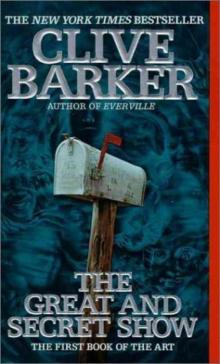 The Great and Secret Show
The Great and Secret Show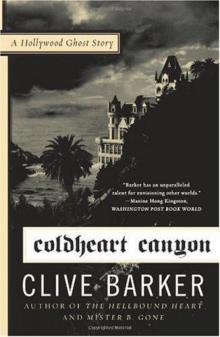 Coldheart Canyon: A Hollywood Ghost Story
Coldheart Canyon: A Hollywood Ghost Story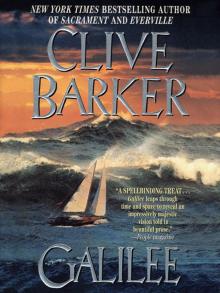 Galilee
Galilee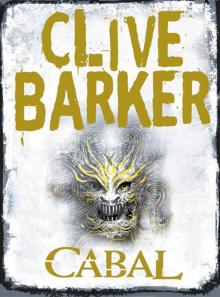 Cabal
Cabal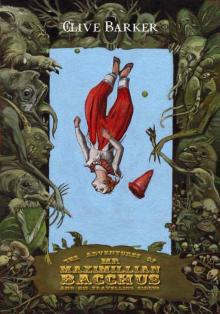 The Adventures of Mr. Maximillian Bacchus and His Travelling Circus
The Adventures of Mr. Maximillian Bacchus and His Travelling Circus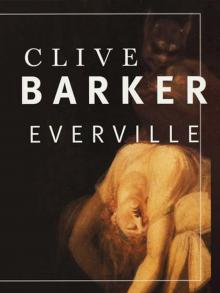 Everville
Everville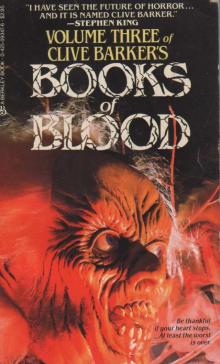 Books of Blood: Volume Three
Books of Blood: Volume Three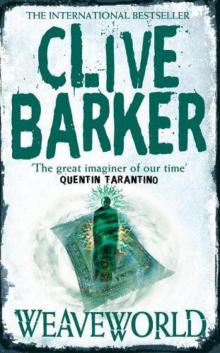 Weaveworld
Weaveworld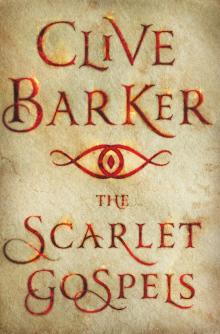 The Scarlet Gospels
The Scarlet Gospels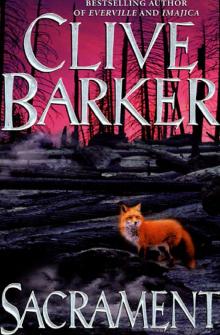 Sacrament
Sacrament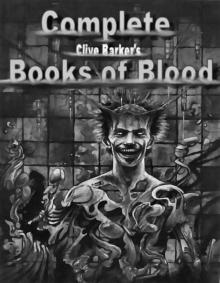 Books of Blood: Volumes 1-6
Books of Blood: Volumes 1-6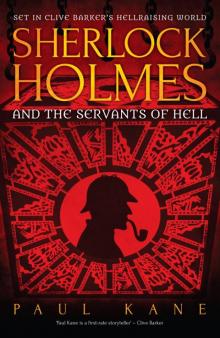 Sherlock Holmes and the Servants of Hell
Sherlock Holmes and the Servants of Hell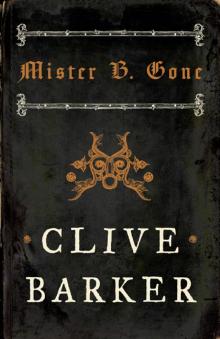 Mister B. Gone
Mister B. Gone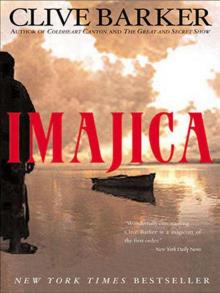 Imajica
Imajica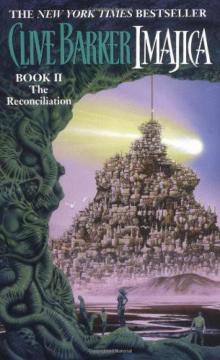 The Reconciliation
The Reconciliation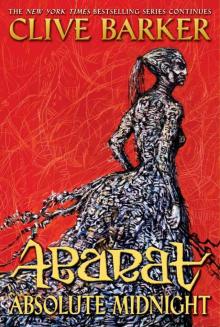 Abarat
Abarat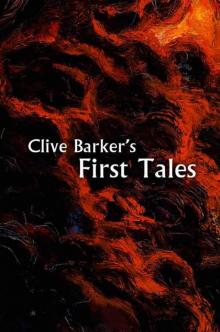 Clive Barker's First Tales
Clive Barker's First Tales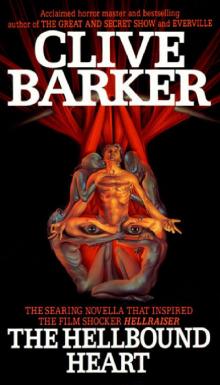 The Hellbound Heart
The Hellbound Heart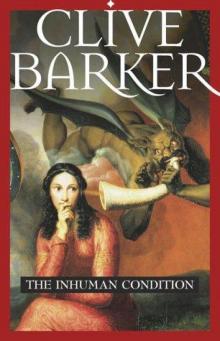 The Inhuman Condition
The Inhuman Condition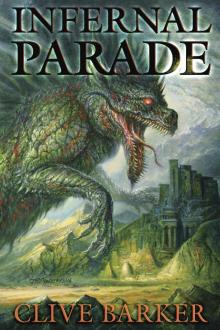 Infernal Parade
Infernal Parade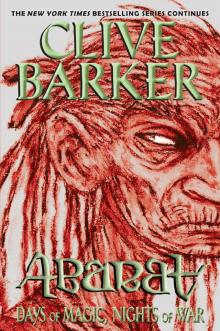 Days of Magic, Nights of War
Days of Magic, Nights of War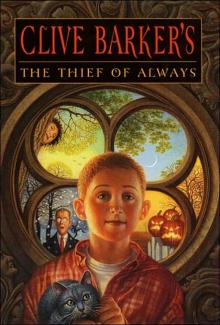 The Thief of Always
The Thief of Always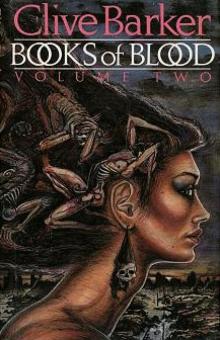 Books of Blood Vol 2
Books of Blood Vol 2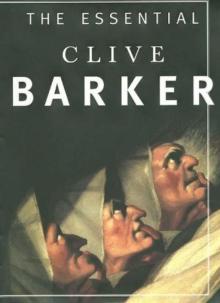 The Essential Clive Barker
The Essential Clive Barker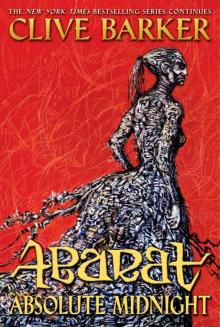 Abarat: Absolute Midnight a-3
Abarat: Absolute Midnight a-3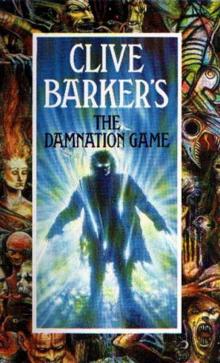 The Damnation Game
The Damnation Game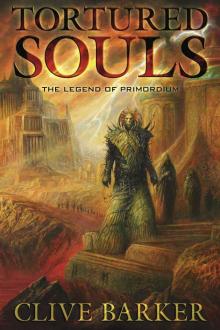 Tortured Souls: The Legend of Primordium
Tortured Souls: The Legend of Primordium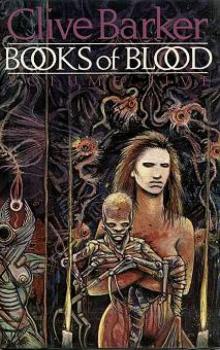 Books of Blood Vol 5
Books of Blood Vol 5 Imajica 02 - The Reconciliator
Imajica 02 - The Reconciliator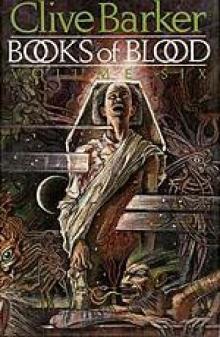 Books Of Blood Vol 6
Books Of Blood Vol 6 Imajica 01 - The Fifth Dominion
Imajica 01 - The Fifth Dominion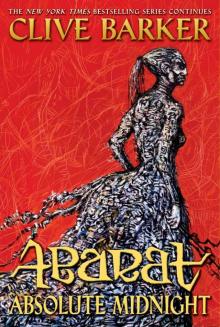 Abarat: Absolute Midnight
Abarat: Absolute Midnight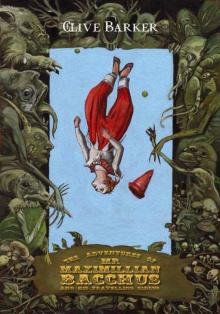 The Adventures of Mr. Maximillian Bacchus & His Traveling Circus
The Adventures of Mr. Maximillian Bacchus & His Traveling Circus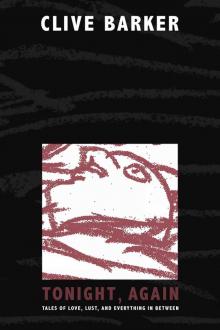 Tonight, Again
Tonight, Again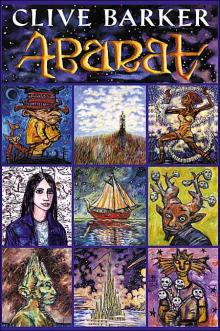 Abarat: The First Book of Hours a-1
Abarat: The First Book of Hours a-1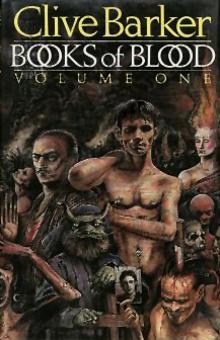 Books Of Blood Vol 1
Books Of Blood Vol 1 Age of Desire
Age of Desire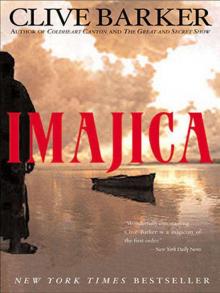 Imajica: Annotated Edition
Imajica: Annotated Edition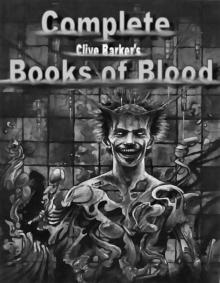 Complete Books of Blood
Complete Books of Blood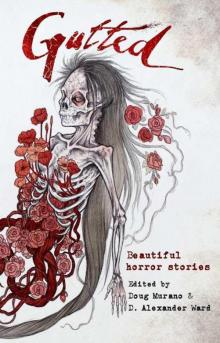 Gutted: Beautiful Horror Stories
Gutted: Beautiful Horror Stories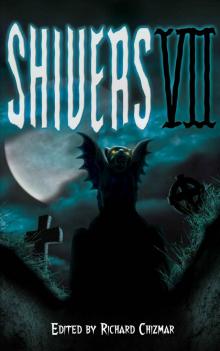 Shivers 7
Shivers 7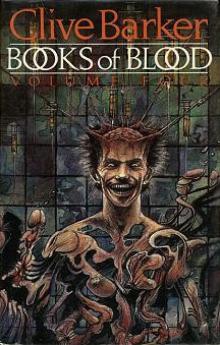 Books Of Blood Vol 4
Books Of Blood Vol 4